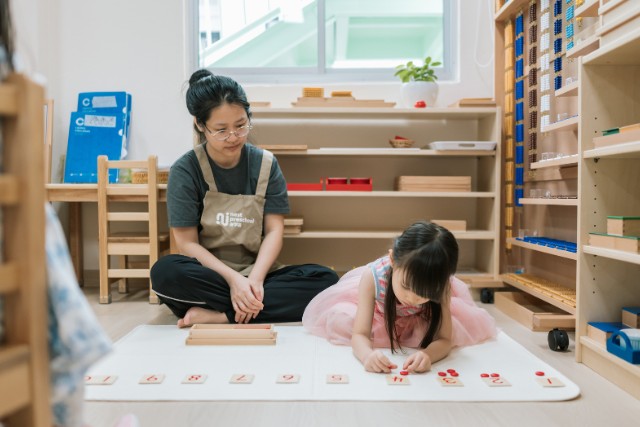As your child progresses from lower to upper Primary, subjects also become more complex. In Upper Primary English, the more challenging areas include comprehension and composition.
What are the common mistakes students make in these areas, and what strategies can parents equip them with to improve? Mr Charlie Spiller, Head of Primary Courses at British Council Singapore shares his insights.
3 Common Mistakes Students Make In English Comprehension
More common mistakes tend to be about accuracy and exam techniques. These include:
- Misreading or misinterpreting the question. This means students are looking for the wrong information in the text.
- Poor grammatical accuracy in their written answers.
- Being unfamiliar with the expectations of certain PSLE question types. For e.g. questions that expect students to provide evidence to justify their answers.
Why Do Children Struggle With Comprehension?
Lack of background knowledge and inferencing skills – are the two main reasons why Upper Primary students struggle with English comprehension.
The biggest challenge is the lack of background knowledge. Decoding letters and words can only get students so far. The best readers are not the ones who can decode the fastest, but the ones who can understand the topic and connect it to prior similar knowledge.
For example, most people can read the following sentence:
“A player is in an offside position, when he/she receives the ball which is played forwards by a teammate, actively involved in the play.”
But do they understand it?
Your average 10-year-old soccer fan would most likely get it immediately, even if they were considered poor readers at school.
Studies show that even if ‘weaker’ readers have background knowledge of the topic, they will likely score the same as the traditionally ‘strong’ readers.
Why? Because background knowledge is fundamental to comprehension.
Writers also leave intentional gaps that readers need to fill. So readers need to understand what the writer has left out. Furthermore, the best writers write scenes with imagery rather than explaining them in detail.
The above skills are the foundation for understanding text at inferential levels, and these skills need to be taught explicitly.
ENGLISH COMPREHENSION TIPS (For P4 and above)
- Fill in the gaps
Parents and teachers play a role to fill in the ‘knowledge gaps’. Include a wide variety of challenging texts for your child to practise deep reading. Create opportunities to develop their background knowledge in a range of engaging and relevant topics.
- Teacher’s feedback
Be aware of the English teacher’s feedback and check that your child is responding to the feedback. Have a look at your child’s work and check that they understand the corrections. If they don’t, encourage them to approach their teacher for more clarity.
- Read aloud
Most parents believe that reading aloud to their children should only be done when they’re in pre-school. But reading aloud to your primary school child can be incredibly effective for developing inferential skills and background knowledge.
While reading with your child, you can help fill in the blanks in general knowledge. This will help your child become a better reader, as well as open room for discussion on the text they are reading.
ENGLISH COMPOSITION TIPS (For P4 and above)
Children can get lots of practice but don’t always get the support they need to become better writers. Writing is a complex process that requires both regular practice and support.
- Expand their knowledge
Pay more attention to increase their background knowledge. If your child doesn’t know a topic or a plotline, they will find it hard to develop and sustain ideas and appropriate language.
- Engage in conversations and ask questions
If you can say it, you can write it. Talking through ideas, ideally paragraph by paragraph can have a significant impact on your child’s ability to both get started and sustain a piece of writing. Good ideas can be further developed, bad ones can be discarded before the pen is put to paper.
- Inspire your child to write better
Encourage your child that writing can always be improved. Every piece of writing should be treated as a draft, apart from the final exam. Whether this is actively fixing spelling errors or re-formulating whole sentences, or making better choices with adjectives. Lastly, ensure that your child understands his teacher’s feedback and is working on his corrections.
British Council’s New Upper Primary Course
Understanding Singapore’s Ministry of Education (MOE) curriculum and what is required to excel in local exams, the new Upper Primary English courses at the British Council course are designed to help your child succeed well in their PSLE.
It supplements learning in local schools and targets concepts and topics Singaporean students struggle with the most.
⇒ Related Read: Why your child will love this new English nursery programme
How it will give your child a solid head start to ace his PSLE English
- Course curriculum focuses on comprehension strategies, composition techniques, challenging tasks
- Regular PSLE-style exam practice and quality feedback is provided
- Teachers actively focus on the accuracy of students’ answers against local test types.
- A wide variety of challenging texts will be provided for students to practise deep reading and expand their background knowledge in a range of engaging and relevant topics
➡️ Related Read: Mistakes to Avoid for PSLE English Composition
What your child will gain from the Upper Primary course
- Comprehension strategies to improve their techniques using fiction and non-fiction texts
- Composition techniques to develop their composition skills through a range of MOE texts.
- Regular practice in PSLE-style exam questions with our assessment book developed by an MOE expert.
- Deeper knowledge of home and international topics and being able to apply it to writing, reading and oral tasks.
- Quality, individual feedback on learning progress.
This course is for Primary 4 and 5 students and is offered at four British Council centres – Napier Road, Tampines, Toa Payoh and Marsiling. British Council also offers courses for all Primary levels, as well as Pre-school and Secondary.
To find out more, visit britishcouncil.sg.
Why British Council?
British Council is the UK’s international organisation for cultural relations and educational opportunities. For several decades, the British Council has helped elevate the English standards of pre-school, primary and secondary school students in Singapore.
In 2018, the British Council will be launching their new Upper Primary curriculum which focuses on comprehension techniques and composition strategies, supported with regular PSLE-style exam practice and individual feedback.
This post is brought to you by British Council Singapore.
* * * * *
Like what you see here? Get parenting tips and stories straight to your inbox! Join our mailing list here.
Running a service or business targeted for parents? Reach out to a wider audience in our Best Enrichment Classes compilation. Leave your contact details here and we will get in touch with you.






























































